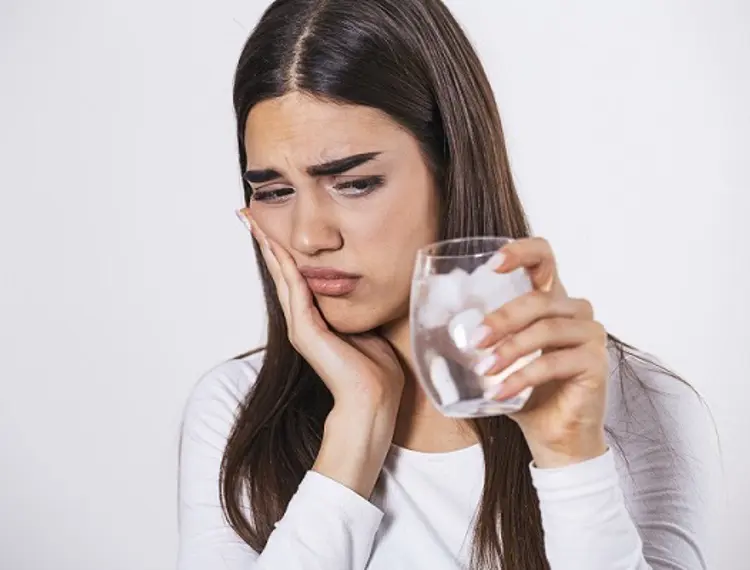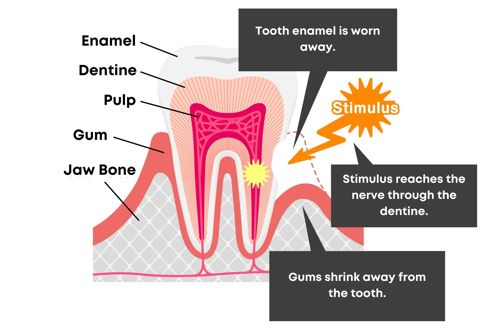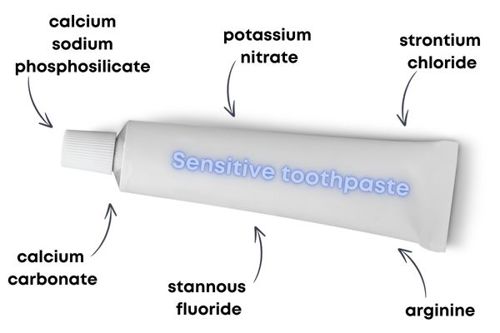
Key messages
- You can have 1 or many sensitive teeth.
- Tooth sensitivity usually feels like a short, sharp pain.
- When the cause of the sensitivity is removed from the mouth, the tooth pain will go away.
- There are toothpastes that are made to treat sensitive teeth. These toothpastes will not help if tooth decay is causing your teeth to be sensitive.
- Your dentist is the best person to help you find out of the cause of your tooth sensitivity.
There are many reasons that one or more teeth can be sensitive. You should see a dentist if you have a tooth that is sensitive to cold, hot or sweet foods or drinks. This may be a sign of tooth decay or tooth erosion. It is important to make sure there is no tooth decay or other conditions that are making the teeth sensitive.
Symptoms
Tooth sensitivity will often feel like a short, sharp pain. The pain is a reaction to something contacting your tooth. The pain will usually go away once the stimulus is removed. Examples of a stimulus that can cause pain in sensitive teeth include:
- hot foods or drinks,
- cold foods or drinks,
- cool air, or
- gentle touch, for example from a toothbrush.
If you still have pain after the stimulus is removed, it may be a sign of tooth decay. It is important to see a dentist to find out the cause of the tooth sensitivity.
What causes sensitive teeth?
Teeth can become sensitive when the layers that provide protection are worn away or lost. These layers include tooth enamel and gums. When these layers are lost the inside tooth structure is exposed. This is called dentine. There are nerves inside the dentine that can feel pain.
A stimulus can cause pain when it touches the dentine. This may be diagnosed as ‘dentine hypersensitivity’. It is a very common complaint at the dentist.

Common causes of sensitive teeth
Some common causes of tooth sensitivity include:
- Tooth erosion caused by regularly eating or drinking acidic foods and drinks.
- Gums shrinking away from the teeth.
- Teeth grinding or clenching teeth at night while sleeping.
- Conditions that affect the teeth when they are developing causing them to be weak. For example, enamel hypoplasia.
Teeth can be sensitive after dental treatment. It is usually temporary. It may last for a few days or up to 2 weeks. See your dentist if the sensitivity continues or turns into pain.
Caring for sensitive teeth
It is important to see your dentist if you have one or more sensitive teeth. They will look to see if there is a cause for the sensitivity and how to treat it. At your appointment, your dentist may ask you about your eating, drinking and oral hygiene habits. It is important for them to know about lifestyle factors such as regularly drinking soft drinks, which may be making your teeth sensitive.
Dental treatment
If the tooth sensitivity is due to tooth decay, or a filling in your tooth that is breaking down, you will need to have this fixed. The sensitivity usually goes away once the tooth is fixed. The sensitivity can get worse and turn into bad pain if the cause is not treated.
Toothpaste
Some toothpastes are made to treat sensitive teeth. These are called desensitising toothpastes. There are 2 main ways that the ingredients help to treat tooth sensitivity:
- The nerves in the teeth are soothed and do not keep responding to the stimuli.
- A barrier is made over the sensitive area of the tooth stopping it from responding to stimuli.
These toothpastes will not help if tooth decay is causing your tooth to be sensitive. Your tooth will probably need to be fixed using a filling.
Toothpaste ingredients added to treat sensitive teeth

How to prevent sensitive teeth
Taking good care of your teeth is the best way to protect them from tooth sensitivity.
- Brush two times every day with fluoride toothpaste and floss every day.
- Do not press too hard when brushing your teeth.
- Limit the amount of sugary or acidic drinks you drink, and do not brush your teeth straight after. Wait at least 60 minutes before brushing. Brushing too soon can cause tooth wear.
- Drink tap water to stay hydrated. Do not add citrus fruit, such as lemon, to your water and sip it during the day. This can cause tooth erosion and tooth sensitivity.


